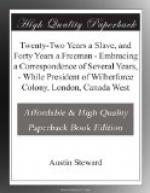This year also, my father died in the village of Palmyra, where, as I have before mentioned, he received injuries from which he never entirely recovered. After about six months severe illness which he bore with commendable patience and resignation, his spirit returned to God who gave it; and his sorrowing friends and bereaved family followed his remains to their final abode, where we laid him down to rest from unrequited labor and dire oppression, until “all they who are in their graves shall hear the voice of the Son of God, and they that hear shall live forever,” where the “tears shall be wiped from off all faces”—and where the righteous bondman shall no longer fear the driver’s lash or master’s frown, but freely join in the song of “Alleluia! The Lord God Omnipotent reigneth!”
My father had a good reputation for honesty and uprightness of character among his employers and acquaintances, and was a kind, affectionate husband and a fond, indulgent parent. His, I believe was the life and death of a good man. “Peace be to his ashes.”
The following season I commenced a new business—that of peddling in the village of Rochester such articles as my employer, Mr. Comstock, desired to sell: the products of his farm,—wheat, corn, oats, butter, cheese, meat, and poultry—all of which met a ready sale, generally for cash at liberal prices. That market was then but little known to the generality of farmers, and the enterprising gentlemen of that place, were desirous of encouraging commerce with the surrounding country, offered every encouragement in their power. Hence, we found it a profitable business, which I continued in for several months.
The present flourishing city of Rochester was then, as I have said, but a village in its infancy, situated near the upper falls of the Genesee River, and about seven miles from its mouth. Here, some time previously, three gentlemen from Maryland bought a large tract of land, and as no business man could fail to observe and appreciate its rare advantages they commenced laying out a village. Sirs Fitzhugh, Carroll, and Rochester, composed the company; but the management of the business devolved almost wholly on Col. Rochester, whose wealth, enterprise, and intelligence well qualified him for the undertaking; and as it had been assigned him to cognominate the new village, I have heard it said that he jocularly gave his reason for selecting its present title, as follows: “Should he call it Fitzhugh or Carroll, the slighted gentleman would certainly feel offended with the other; but if he called it by his own name, they would most likely both be angry with him; so it was best to serve them alike.”
There was then two grist mills,—one owned by Mr. Ely, and the other by Mr. Brown; one small building for religious worship, occupied by the Presbyterians on Carroll street (now State street); and but two stone buildings within what now comprises that beautiful city. There were then no brick buildings at all, but business was good; merchants and mechanics from the East soon began to settle there and give it a thriving aspect.




